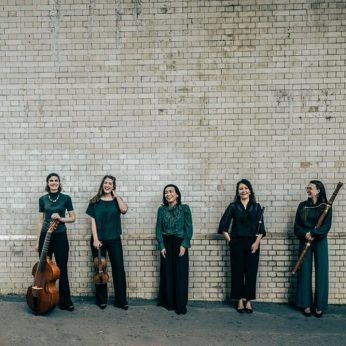Composer: Various Composers ()
Performance date: 02/07/2022
Venue: St. Brendan’s Church
Duration: 00:45:52
Recording Engineer: Simon Cullen, Ergodos
Instrumentation Category:Baroque Ensemble
Artists:
Flavia Hirte [flute], Alice Earll [violin], Catriona McDermid [bassoon], Kate Conway [viola da gamba] Satoko Doi-Luck [harpsichord] -
[Ensemble]

Persée et Andromède
Andromède (Andromeda) was the beautiful daughter of King Cepheus and Queen Cassiope of Joppa. In one version of this myth, The Queen had offended the Nereids by claiming her daughter to be more beautiful than anyone else. Since only Andromède’s sacrifice would appease the gods, she was promptly left chained to a rock to be devoured by a sea monster. Luckily, Persée (Perseus), the son of mighty Zeus and mortal Danaé, the slayer of the Gorgon Méduse (Medusa) , flew by on the winged horse Pégase (Pegasus) and saved Andromède. Shortly after the pair were married, and lived a long and happy life together.
Jean-Baptiste Lully [1632-1687]
Excerpts from Persée arr. Catriona McDermid
Ouverture – Air – Entrée des nymphes guerriers – Entrée des divinités infernales – Entrée de fantosmes – Gigue – Passacaille
Although born in Italy, Jean-Baptiste Lully is known as the composer who defined the French Baroque style. Lully amassed numerous royal positions during his time at King Louis XIV’s court, but perhaps most important was his appointment as director of the Académie Royale de Musique (Royal Opera). Lully’s opera Persée premiered in 1682 at the height of the composer’s popularity, with a libretto by Philippe Quinault. The opera is told from the perspective of Persée, who fights the Gorgon Méduse with help from the gods; Warrior Nymphs bring him a diamond shield and Fiery Spirits from the underworld present him with a helmet of invisibility. After one final storm Persée rescues Andromède and everything ends happily with a feast at Vénus’ palace.
Louis Antoine Lefebvre [1700-1763]
Andromède, Cantatille a voix seule avec simphonie
Air tendre – Récitatif, ‘Andromède tremblante’ – Tempête – Ariette
Not much is known about the French composer Louis Antoine Lefebvre. Born in the early 1700’s in Picardy, at some point he became the organist of Saint-Louis-en-l’Île in Paris. Nearly all of his works are for the voice and his Cantatille Andromède is a wonderful example of his style. The Cantatille depicts Andromède’s plight and the intensity of the love she feels for Persée. The term Cantatille first appeared around the 1730s and as the name suggests, a ‘Cantatille’ is a mini-cantata. This reduced format however does not lessen the virtuosity of the writing, nor the intensity of the emotions.
Marc-Antoine Charpentier [1643-1704]
Musique de théâtre pour ‘Andromède’ arr. Catriona McDermid
Prologue ouverture – Prèlude – Intercède du premier au second acte – Les Vents – Caprice – Intermède du 3 au 4 acte – Intermède du 4e au cinquième acte – Gigue Angloise
The composer Marc-Antoine Charpentier spent many years in service to Mademoiselle de Guise, the first cousin of Louis XIV. At this time, Lully had a royal monopoly over the performance and publication of opera and in 1682, Lully debuted his opera Persée. In the same year, Charpentier took the opportunity to revive Pierre Corneille’s 1650 drama Andromède. It was billed as a spoken drama with incidental music, however, Charpentier wrote so much music that some argued it was almost an opera. Had Charpentier not been under the protection of Mme de Guise, it is unlikely he would have gotten away with such a bold move. Corneille’s version tells the story of Andromède, the victim of spiteful gods finally saved by Persée.
Jean-François Dandrieu [1682-1738]
Sonate en Sol Mineur Op 1, No 3
Adagio – Allegro – Adagio – Giga
Jean-François Dandrieu was born in Paris into a large family of musicians, as a child prodigy he gave his first public performance at the age of five for King Louis XIV. This marked the beginning of a very successful career as a harpsichordist and organist. Although his writing is reminiscent of François Couperin’s style, the counterpoint is more developed. His trio sonatas are much more Italianate, moving away from the French dance suite towards more florid and Corellian composition styles.
Antonio Vivaldi [1678-1741]
Andromeda Liberata, Anh. 117: ‘Sovente il sole’ (Perseo)
First performed in 1726, ‘Sovente il sole’, is an aria by the Venetian composer Antonio Vivaldi, taken from Andromeda Liberata. This pasticcio-serenata tells the story of Andromeda’s rescue from the sea monster Cetus by demi-god Perseo facing stormy seas, angry gods and a whole host of other mythological trials and tribulations. The publication was a collective tribute from at least five composers, including Vivaldi, for Cardinal Ottoboni.
– Alice Earll
Copyright © 2025 West Cork Music. All rights reserved.
Designed and developed by Matrix Internet